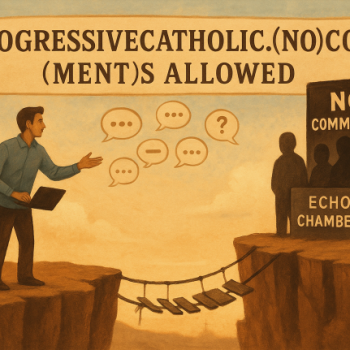This is the fourth reflection in our Advent Series, "The Hopes and Fears of All the Years," by biblical scholars and preachers John C. Holbert and Alyce McKenzie. For an overview of the series with links to all the reflections, click here.
Fourth Sunday in Advent
Matthew 1:18-25
In our text for the fourth Sunday in Advent, Joseph’s fear of betrayal, and our own, are met and overcome by the hope of the birth of a savior.
I attended a conference of teachers of preaching several years ago in Santa Fe, New Mexico. Our morning worship services were held in the historic Loretto Chapel, a small Gothic chapel on the Old Santa Fe Trail built in 1873. There is a legend about the Loretto Chapel, and it begins like this.
When the Chapel was built, the architect forgot to include a way for the nuns to reach the choir loft. The sisters weighed their options, but all were equally undesirable. They could build a conventional staircase, but that would take up too much room. They could rebuild the balcony, but that would be far too expensive. They could climb a dangerous ladder up and down, but that would be an accident waiting to happen. So the nuns did what you and I should do when faced with a difficult situation -- they prayed.
Their predicament reminds me of Joseph’s, swept into a situation in which one’s only choices seem to be negative ones. They talk about dilemmas having two horns -- either one you sit on you get a sore seat! Divorce her publicly, divorce her quietly, either way, I still have to divorce her. No way out. No possible resolution that could lead to a redemptive resolution. Only pain. It never occurred to him that Mary’s unbelievable story might be God’s truth. It never occurred to him that the only thing lacking was his embrace of that truth -- and the situation would be transformed.
What do we do when we face a situation in which our only choices appear to be negative? Agonize. Overeat. Take it out on those we love. Try to get someone else to make up our minds for us so we can blame the outcome on them.
No way out -- only negative options. I feel for Joseph, and I’ll bet you do too. When faced with the dilemma, his human reason was able to discern only negative action options. Perhaps reading between the lines of the Bible, he had a talk with himself that went something like this:
I cannot believe that she has done this to me. I have been sitting here all day. I have been praying, I have even cried. For one fleeting moment, I even considered the possibility that she was telling the truth, but it is more than I can swallow. What man would fall for a story like this? It would serve her right to be publicly shamed. Why not? Nobody in town would blame me. But I am not a vengeful man. I am a man strong within myself, not concerned with others’ opinion of me. I have nothing to gain by humiliating her. I believe I will divorce her and save her the public humiliation of accusing her of adultery. It will be a quiet matter, the sooner we get it over with the better. I always try to think the best of people. How I wish I could of Mary! And of God. I confess I feel somewhat betrayed by God as well as by Mary. They say that you should never let the sun go down on your anger, but the sun is setting, and I am filled with pain. I will go to bed with my pain, and hope for sleep. Tomorrow I will send a message to Mary letting her know of my decision.
Joseph didn’t stick to his resolve. He’s in all the crèche scenes.
Maybe you’ve seen the famous painting by Rembrandt in which the young Joseph, hair tousled, face lined with fatigue and strain, stands one shoulder thrust forward as if to protect Mary from the throng, gazing into the fire with an anxious look. Between his decision to divorce her and his presence at her side on that night of birthing, something dramatic must have happened. What?
Our text tells us what: a night of birthing just as real as Christmas Eve. The birth of a father for the Son of God. In his sleeping state, Joseph allowed God to speak to the depths of his heart and to offer a resolution to his dilemma that his human reason had failed to discern.
On this night, as much as on Christmas Eve, an angel hovered near, whispering a message from God into Joseph’s sleeping ear. The angel interrupted the nightmare visions of accusation and estrangement that played in the theater of Joseph’s dreams. The angel replaced them with a manger scene and visions of a boy growing and becoming strong.
“Here,” whispered the angel, “is the key that unlocks your dilemma. Believe her unbelievable story. Marry her, and become the father of God’s child. He will need a father to be accepted by others as he grows to manhood. He will need, not just any father, but a father like you, capable of nurturing him, and giving him a name. ‘Immanuel -- God with us.’





